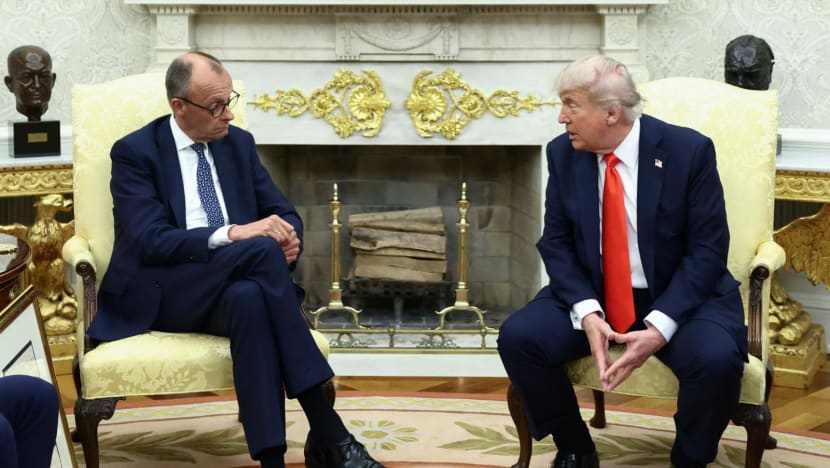Trump, Germany's Merz begin talks on Ukraine and trade in cordial White House meeting

President Donald Trump and German Chancellor Friedrich Merz meet at the White House in Washington on Jun 5, 2025. (Photo: Reuters/Kevin Lamarque)
WASHINGTON: US President Donald Trump and German Chancellor Friedrich Merz opened their first White House meeting on Thursday (Jun 5) with discussions on Ukraine, trade and defence spending, setting a more cordial tone than Trump’s recent Oval Office sessions with other foreign leaders.
Trump praised Merz as a "good representative of Germany" and "difficult," which he suggested was a compliment. He said US troops would remain in Germany and welcomed Berlin's increased defence spending.
Merz expressed readiness for a deeper relationship with Washington. The two conservatives appeared to get along well, trading pleasantries about accommodations and exchanging thanks during their brief press remarks.
TRADE AND TARIFFS LOOM OVER DIPLOMACY
Despite the friendly atmosphere, unresolved tensions on trade lingered. The US and European Union are negotiating a broader trade agreement crucial to Germany's export-driven economy. Trump, however, signalled flexibility on whether a deal materialises.
"We’ll end up hopefully with a trade deal. I'm okay with the tariffs or we make a deal," Trump said.
Merz, who assumed office last month, had said ahead of the meeting that he expected no major breakthroughs but intended to raise issues such as Russia’s invasion of Ukraine, US tariffs and NATO coordination. Germany remains Ukraine's second-largest donor behind the US.
Trump has continued to push NATO allies to boost defence budgets. He hinted, however, that Berlin should not go overboard given its 20th-century history. Merz, for his part, supports increasing Germany’s defence outlays to 5 per cent of GDP.

SECURITY STAKES AND POLITICAL CONTRASTS
The meeting comes amid broader strains between the US and Europe, fuelled by Trump’s interventions in European domestic affairs and support for right-wing movements. Trump has also challenged European stances on immigration and digital speech regulation.
Merz’s team reportedly sought guidance from other leaders on managing meetings with Trump to avoid public clashes. The summit precedes a major NATO gathering, where alliance unity and burden sharing will again be tested.
Security concerns remain top of mind for Berlin, which has depended on US nuclear deterrence since World War Two. Trump’s past threats to withhold protection from countries not meeting defence targets have unsettled European capitals.
Still, Merz has moved swiftly on foreign policy. He led a European delegation to Kyiv shortly after taking office and drew praise from US Defence Secretary Pete Hegseth for backing the proposed 5 per cent NATO spending target.
Sudha David-Wilp of the German Marshall Fund said Merz’s actions show "Germany is willing to accept greater responsibility for Ukraine and the European security order" — long-standing US priorities.
Both leaders share business backgrounds, right-leaning politics, a hardline stance on immigration, and an interest in golf. However, Merz has also criticised Trump. Before his own election win in February, Merz described Trump campaign rhetoric as "ultimately outrageous," likening it to Russian interference.
Their meeting may signal a reset, but significant policy gaps remain to be bridged.














